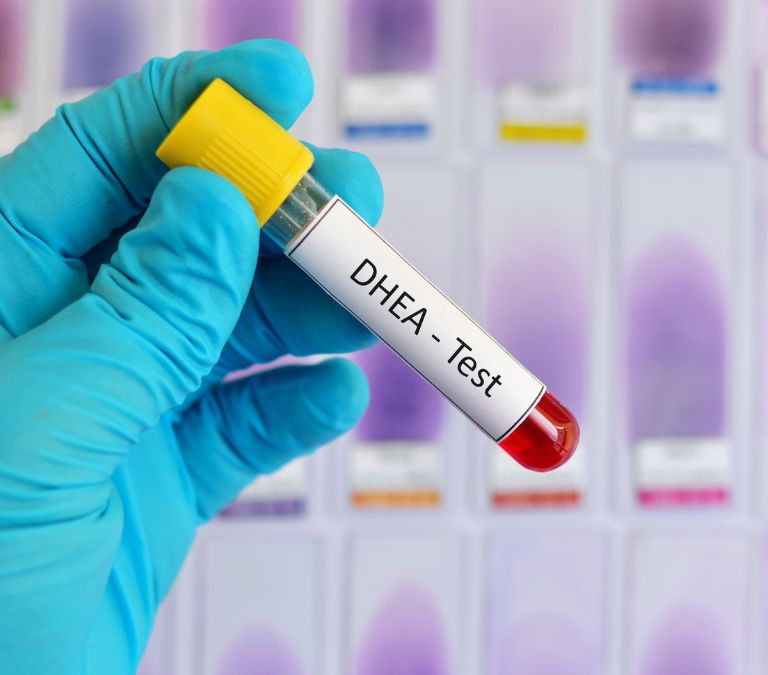Menopausal Symptoms can come in different forms with changes to a woman’s body. As a woman walks into the menopausal phase of her life, the symptoms come with physical and psychological pains for the woman. To this end, different mechanisms, medications, and strategies have been implemented to help women alleviate their pain. One of these is called Dehydroepiandrosterone (DHEA). In this article, be discussing how to use DHEA for menopause and everything other things you need to know about the side effects of dhea for menopause, cost, and what have you.
What Is DHEA?
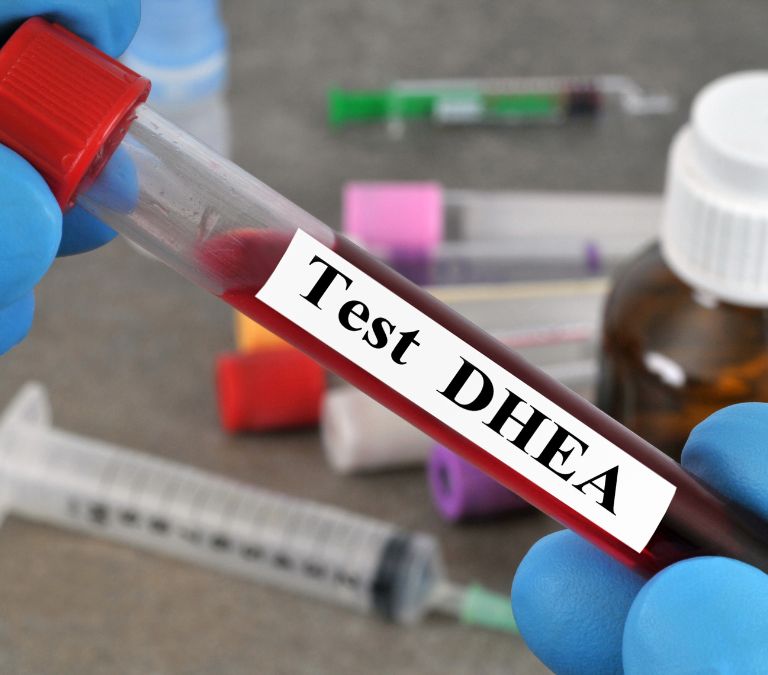
Dehydroepiandrosterone (DHEA) is the production path for all hormones in the adrenal gland. It is a hormone produced naturally in the body which aids in the production of other hormones, especially estrogen and testosterone. So, in a way, Dehydroepiandrosterone (DHEA) can be referred to as the production hormone for other hormones.
I call Dehydroepiandrosterone (DHEA) the mother hormone since it works to produce other hormones. So naturally, Dehydroepiandrosterone (DHEA) works so well in early adulthood, and its efficiency gradually reduces as we age. That means the younger you are, the better the production rate of Dehydroepiandrosterone (DHEA).
Types of DHEA
Dehydroepiandrosterone (DHEA) is one as far as the body system is concerned. There are no types of Dehydroepiandrosterone (DHEA), but if we look at the production path, we can deduce two types. These types include naturally synthesized Dehydroepiandrosterone (DHEA) and synthetic Dehydroepiandrosterone (DHEA).
Natural Dehydroepiandrosterone (DHEA)
As its name sounds, it is produced naturally via the adrenal glands. Thanks to the system that makes the body produce other needed hormones by Dehydroepiandrosterone.
Synthetic Dehydroepiandrosterone (DHEA)
This form of Dehydroepiandrosterone (DHEA) is not the one produced in the body. However, it is made available in dietary supplements. It is made from diosgenin, a substance in wild yam and soy.
How DHEA Works
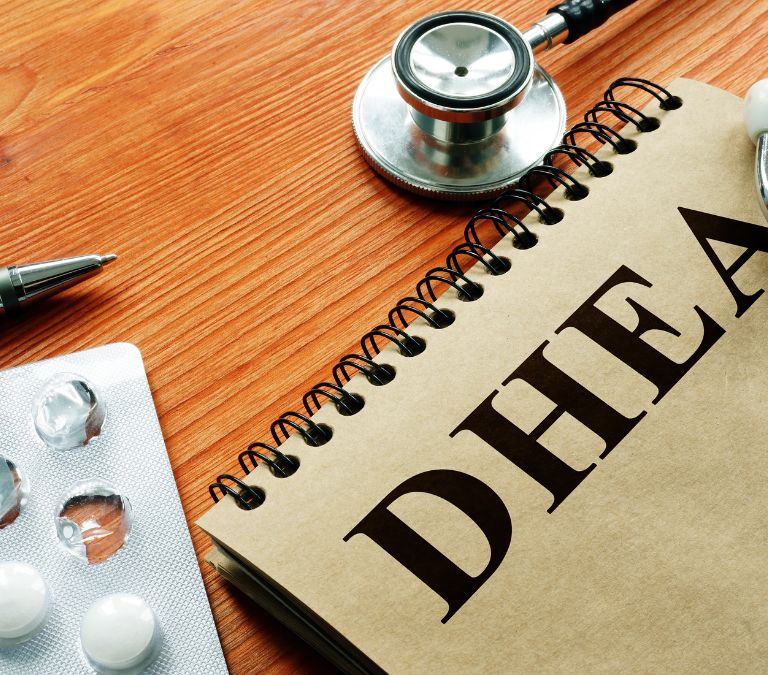
Once Dehydroepiandrosterone (DHEA) is produced by the adrenal gland close to the kidney, it is first converted to an androstenedione hormone in the body. After this, androstenedione will be converted into different hormones. This process is the same for both males and females. However, we focus on female folks because men don’t undergo menopause.
Interestingly, Dehydroepiandrosterone (DHEA) is the most circulating steroid in the body, but it is not that powerful. It only becomes powerful when converted into different hormones like estradiol and testosterone. That means the power of DHEA is in what it eventually becomes to be used in the body. It derives its importance in the body system.
How DHEA Was Invented
DHEA was discovered in 1934 by Hans Dannenbaum and Adolf Butenandt in male urine. It was later rediscovered in human blood plasma in 1954 by Plager and Migeon. People refer to the hormone using different names for a long time until 1959. The current name was first used in 1949. It subsequently became its well-known name today.
At first, it was viewed as a mere aid to producing estrogens and androgens from cholesterol. However, the untiring work of scientists over the decades gradually unveiled all that we know about DHEA today and its uses. It includes how it was synthesized and made available in supplements for easy reach and use by all who need it for one reason.
How To use DHEA for Menopause
The mechanism by which DHEA improves menopausal symptoms is very simple. Recall that DHEA was earlier referred to as the mother hormone because of its place in the hormone universe within the body. It means it works to ensure that other hormones are produced. For women, estrogen is the main hormone that helps a woman function well and lives a quality life.
This same estrogen is identified to hit low production or availability at menopause. The result of this is described as menopausal symptoms. Therefore, a woman will live a better life if we step up estrogen. This contribution is where DHEA makes her way. DHEA improves hormone synthesis so that the woman becomes truly alive again after menopause.
10 Menopausal Symptoms DHEA will Improve
DHEA is a mother hormone and since menopause is all about hormone fluctuations and reductions, infusing the appropriate hormone with its quantity is the way to relieve a woman of the pains. To this end, DHEA will be instrumental in giving women peace of mind during and after menopause. Here are ten menopausal symptoms DHEA can improve;
- Weight Gain
Weight gain is one of the well-known menopausal effects. However, you don’t have to worry much about it because we have a solution for you. With DHEA, you can beat weight gain. Here is what it does- it will increase your metabolism and reduce your appetite. The result will be weight loss. I mentioned earlier that you don’t need to worry about weight gain.
- Depression
Another byproduct of menopause is depression orchestrated by low estrogen levels. DHEA produces this same estrogen; if the natural body synthesized DHEA is low, a DHEA supplement is used to enhance the life back of the menopausal woman, thereby lifting her out of depression. It is another way to improve a woman’s life during and after menopause.
- Vagina Thinning
One of the major aftermaths of menopause is vagina thinning. It may lead to painful sexual intercourse. One good way to solve this issue is to use DHEA inserts. Inserting DHEA inserts into the vagina has reduced pain in sex by up to 15%. It means DHEA is helping to improve the menopausal experience and giving women who have passed menopause another chance to enjoy sex.
- Sex Drive
Sex drive is linked to estrogen level; as it goes down, so does sex drive. To supply some estrogen, DHEA may be administered to the woman. It will be a probable solution in addition to stimulation and other solution paths. Stepping up the estrogen level via DHEA administration is to be monitored by a medical practitioner.
- Fatigue
Women going through menopause or after menopause may find out that they are getting tired easily. It is not just because they are getting old but also because the hormone imbalances take a toll on the woman. The hormones are short-supplied to the body system. A good dose of DHEA will enhance the strength needed to function accordingly.
- Osteoporosis
We understand that you may have concerns about your weakening bones. Well, know the cause; low DHEA (a menopausal symptom) is linked to low bone density and high fractures. Therefore, a good dose of DHEA is a solution for you. First, however, you should let your medical doctor examine the level of your osteoporosis and give you a dose to take. Generally, you may take it for a few months for effective results.
- Hot Flash
Studies have shown that DHEA is an effective solution for women who experience hot flashes during menopause. In addition, research shows that four weeks of using DHEA effectively reduces hot flashes. Please follow the guidance of your medical practitioner in administering DHEA.
- Dry Skin
DHEA has been identified to help improve the skin of women. It works well on the upper layer. It improves the thickness of the skin and the hydration of the skin. These two works on the skin by DHEA will help menopausal women feel better about themselves as it is now for other women.
- Adrenal Insufficiency
You may have heard of adrenal insufficiency without understanding its meaning. Forget about the jargon; it simply means the adrenaline can’t produce the right amount of hormones. Although, if left unattended, it can be life-threatening, adrenal insufficiency is treated with a quality DHEA supplement. So, you see that it’s nothing to worry about in the real sense.
- Insomnia
Melatonin is the sleep hormone that controls and grants our sleeping patterns. This hormone is negatively impacted by menopause hence the sleeping issues. DHEA well-taken increases Melatonin production up to 80%, and once this is achieved. Sleep is restored to normal. So, DHEA improves sleep during menopausal symptoms.
How much DHEA should a menopausal woman take?
As I mentioned above, the intake of Dehydroepiandrosterone (DHEA) is not something that can be self-medicated. DHEA is used under strict guidance because of other health concerns. To this end, the amount a menopausal woman will take cannot be generalized. The amount to be taken is based on what has been treated and how severe it is.
You can treat most menopausal symptoms like hot flashes with a 10-25 mg daily intake of Dehydroepiandrosterone (DHEA) for one year. It is to be taken via the mouth as supported by a few research. DHEA may be used to treat other things apart from menopausal symptoms. So, the intake amount may vary for people with menopausal symptoms and underlying medical conditions. Your medical practitioner will determine that.
Side effects of Using DHEA for Menopause
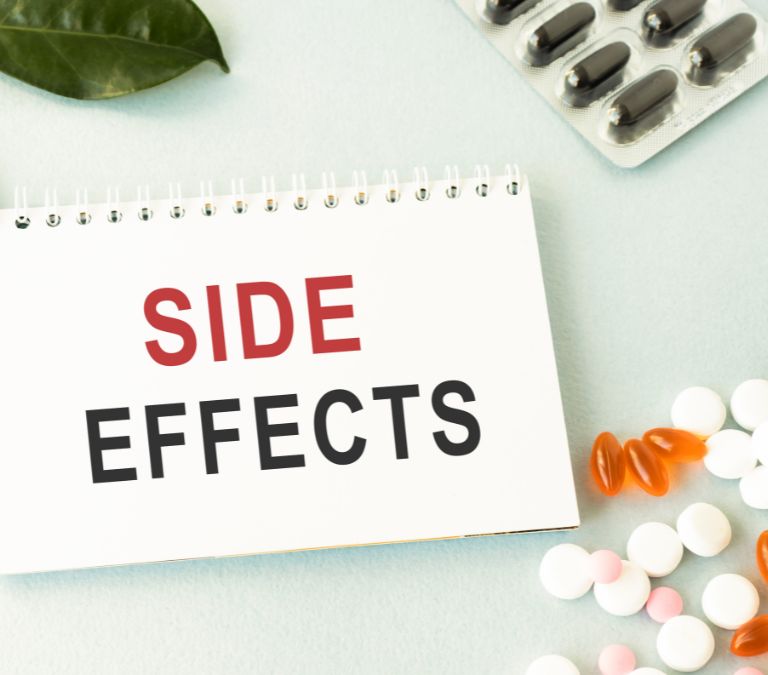
The use of synthetic Dehydroepiandrosterone (DHEA) should be done with much care and under the strict guidance of a medical practitioner who must have certified its use in the first place. Do not use DHEA with self-medication or just a guess, irrespective of what you think it should work for.
It comes with several side effects depending on the person taking it. We are unique in our medical history, genetic order, etc. Some side effects include but are not limited to facial hair growth, acne, abdominal pain, heart palpitations, nasal congestion, deepening of the voice in women, etc.
Those That Should Avoid DHEA
The use of Dehydroepiandrosterone (DHEA) is not for everyone. A medical practitioner should be carried along before using Dehydroepiandrosterone (DHEA). One must try as much as possible to avoid complications irrespective of the medical condition you are already in.
It is important to note that those with a history of heart issues can not use DHEA supplements. They must avoid it by all means. It is also true for those with stroke or its history. DHEA supplements will not help them, but they will cause more damage than they are trying to solve, irrespective of the medical situation that is putting them to use.
Furthermore, nursing mothers, pregnant women, and children should not take DHEA supplements. We already know that not all drugs are advisable for people in this category. The case of DHEA supplements is not different. They must avoid it. It can come with complications.
People with certain diseases are advised to stay away from DHEA supplements. The diseases include but are not limited to diabetes, thyroid disorders, liver disease, blood clotting disorders, etc. People with these ailments who need to take DHEA supplements should talk to their medical doctor for alternative treatments.
More importantly, those with hormonal disorders and hormone-sensitive health issues such as breast cancer must be very cautious in using DHEA supplements. If they have to use it, it must be approved by a certified medical practitioner who knows their medical history and is aware of their current health situation.
Other Menopausal Symptoms Treatment
Combating menopausal symptoms to have your life back and possibly enjoy every moment like you used to doesn’t singularly rise and fall on DHEA; there are other ways to get this same result aside from using dhea for menopause symptoms. Therefore, we shall be sharing the other three options you can bank on to treat your menopausal symptoms.
Hormone Replacement Therapy (HRT)
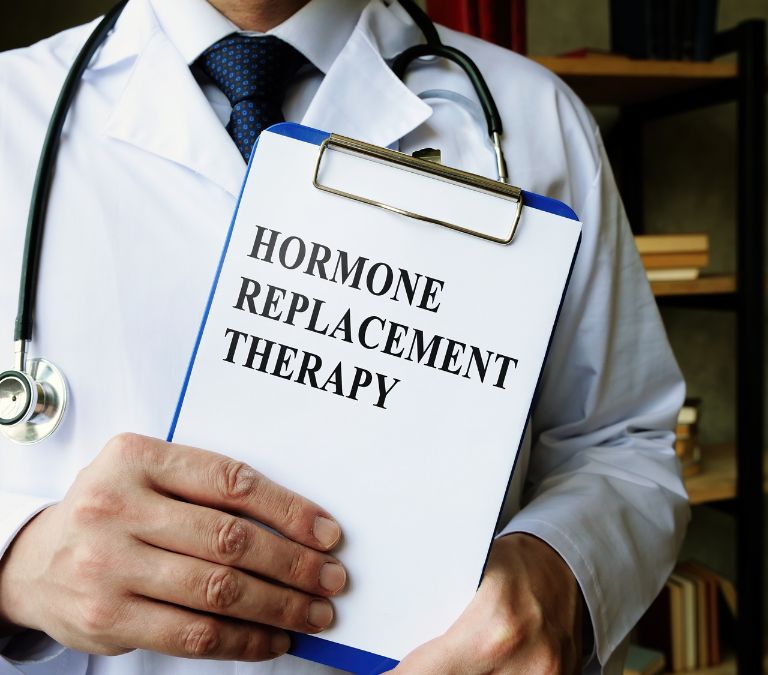
Hormone replacement therapy (HRT) is a treatment that replaces unavailable hormones. As you already know that menopausal symptoms are largely dependent on inadequate or loss of estrogen hormone. For menopausal symptoms, most hormone replacement therapy is focused on replacing estrogen.
Once the estrogen level is back to normal or close to normal, every menopausal symptom is automatically taken care of. If not all, about 95% of the uncomfortable feelings and pains are addressed. Hormone replacement therapy for menopausal symptoms is almost synonymous with estrogen replacement therapy.
Hormone replacement therapy is used to handle specific situations. HRT addresses certain issues caused by the lack of certain hormones. For instance, if you want to work on your womb for any reason, you will need progesterone. It is achieved via hormone replacement therapy. All you need to do is to go for HRT for progesterone.
How Hormone Replacement Therapy (HRT) Is Done
Once you are certain that hormone replacement therapy is the way out and your medical doctor confirms it, your doctor will determine the best way to administer the HRT. That will be co-determined by what you want to treat, the severity, and your medical history. Unfortunately, that silently means you can not do self-medication as far as Hormone replacement therapy is concerned.
Generally, hormone replacement therapy can be administered in different ways. These include cream or gel rub on skin, as an implant, skin patches, or tablets. While these options are available and safe, your medical practitioner will tell you which is best for your situation. The good news is that they all work well.
Hormone Replacement Therapy Risks
I understand the “risk” you see behind this may make you paranoid but read through first. When you understand what I am about to show you, it won’t be as bad as it may look. Some types of hormone replacement therapy may come with health risks of blood clots and breast cancer. It is worthy of note that this is not for all women.
Research has shown that hormone replacement therapy offers more benefits than any disadvantage you can think of. However, you can bypass these advantages if the HRT is administered under strict guidance. Your medical practitioner must be involved in the whole process and be fed with feedback as you go through it.
Cognitive Behavior Therapy (CBT)
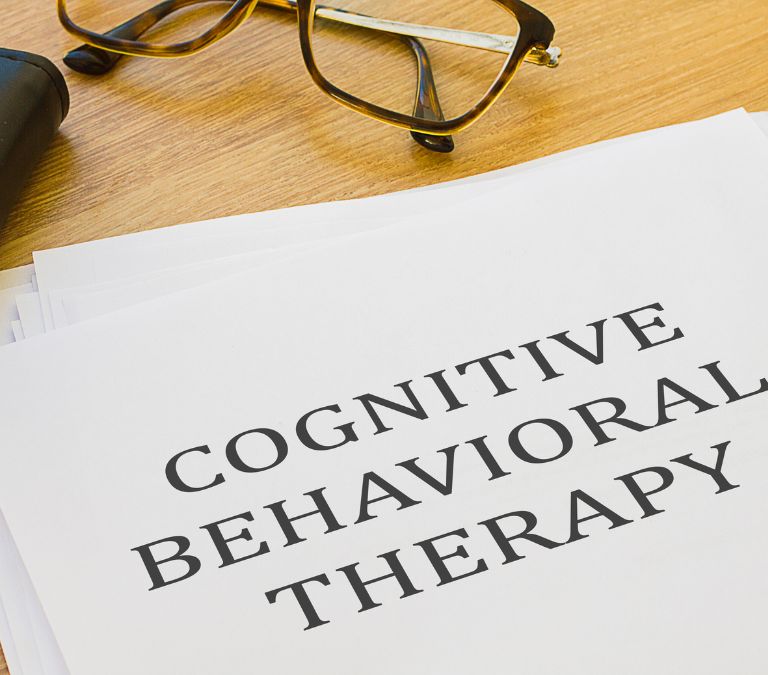
It is a psychological treatment used to treat many things, some of which fall under menopausal symptoms. For instance, mood swings, depression, sleep issues, hot flashes, and hormonal imbalance are all menopausal symptoms that CBT can address. As a woman going through menopausal symptoms, we understand how uncomfortable it may be, so we have provided this information for you.
CBT has been acknowledged to help women function well and live a quality life. Cognitive behavior therapy will work on the limiting beliefs about menopause, status, and aging stigma, which are the primary causes of depression during and after menopause. Therapists will engage women to unlearn and learn new realities and tactics to survive the transition.
There are CBTs specially designed for menopausal symptoms. They help women overcome night sweats, insomnia, and hot flashes, among other menopausal symptoms. It can be self-administered as it is made available in small booklets and administered in groups. The therapist will always find a result-oriented approach when working with you.
The important thing is that you are willing to talk to and work with a therapist. We understand how difficult it may be to discuss your pain during menopausal symptoms. Still, please be rest assured that the therapist is there to help you. Less I forget, all discussions are confidential. You will never hear about it. So, try to be open as much as possible. It is for the very best.
Nutrition Remedy For Menopausal Symptoms
Nutrition is a good way to solve many medical issues, including menopausal symptoms. There is a general view that if you eat well, you will be healthy. You may ask what eating well has to do with menopausal symptoms. Well, it does a lot of good for it. It will not prevent it from coming; it will give you a safe landing so that life is not taken away from you.
But then, we need to stress what eating well means. It doesn’t necessarily mean eating at all times. Well, that’s good advice, but eating well means more. It means taking the necessary nutrients for your age. Every age group has what it needs to keep fit. If you eat well in this regard, your menopausal sign will have a safe landing.
Furthermore, some foods will help you cope with menopausal symptoms. For example, do you know that taking cold water can help reduce hot flashes? It is because dehydration may increase the rate of hot flashes. Soy is another food you need that can help with menopausal symptoms because of the isoflavones content. Please note that only soy in food works, not in tablets.
It is worthy of note that there are foods you must avoid as a woman going through menopause. It is usually a tough one for many. I understand, but you must choose your health over your love for food. You should avoid any food or drink with caffeine at all costs. All foods that trigger your underlying health conditions (if you have one) must be avoided.
Please work with a nutritionist for this purpose. They can help you draw out a meal plan that will help you provide the necessary nutrients for your menopausal symptoms, especially for the issues of concern. And where a woman has underlying medical issues, going by nutrition is most preferred to avoid conflicting treatments.
These three alternatives for menopausal treatment must be viewed and administered by professionals with the client’s health status in mind. That is the only way you can get the best result. So, don’t just pick one because you feel it will work for you. Please consult your doctor first. Ask your doctor for advice if you think one method is good for you.

